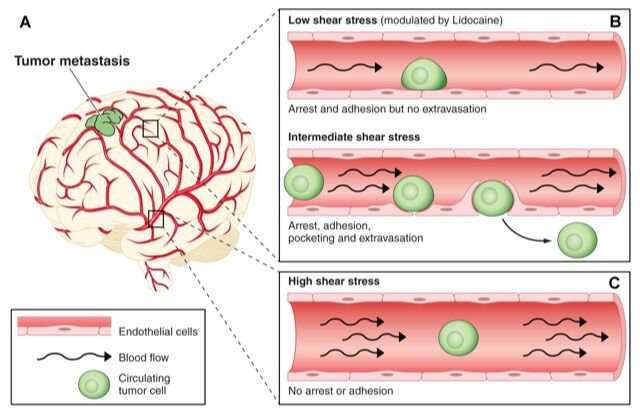Blood flow is a major influence on tumor cell metastasis

Scientists have long theorized that blood flow plays an integral role in cancer metastasis. But new research testing this long-held hypothesis in zebrafish and humans confirms that the circulatory blood flow impacts the position where circulating tumor cells ultimately arrest in the vasculature and exit into the body, where they can form a metastasis.
In a paper published April 9 in Developmental Cell, researchers from the French National Institute of Health and Medical Research (INSERM) found that in the model of the zebrafish embryo, labeled circulating tumor cells (CTCs) could be followed throughout the vasculature. The location where the tumor cells arrested was found to be closely correlated with blood flow rates less than 400-600 μm/s. The larger aim of the study was to visualize the impact of blood flow on important steps in metastasis—arrest of the CTCs, adhesion to the vasculature, and extravasation of the CTCs from the blood vessel.
"A long-standing idea in the field is that arrest is triggered when circulating tumor cells end up in capillaries with a very small diameter simply because of size constraints," says author Jacky G. Goetz, PhD, whose laboratory conducted the study. "This research shows that this position is not only driven by physical constraint but that blood flow has a strong impact on allowing the tumor cells to establish adhesion with the vessel wall. I think this is an important addition to understanding how and where tumor cells would eventually form metastases."
Researchers chose the zebrafish embryo model since its vasculature is highly stereotyped. "This made it much easier to document the position of all the tumor cells after they were injected," explains Goetz. The team compiled all of the images together and created heat maps of the position of the tumor cells in the vasculature.
The researchers also found that blood flow is essential for the process of extravasation, when tumor cells leave the circulatory blood vessel and cross the endothelial barrier at a new site to establish a secondary tumor. "When we did timelapse imaging in the zebrafish embryo, we found that endothelial cells appear to curl around the tumor cells that are arrested in the blood vessel," says Goetz. "Blood flow at this step is essential. Without flow, endothelial remodeling does not occur. You need a certain amount of flow to keep the endothelium active so that it can remodel around the tumor cell."
They further confirmed this observation in brain metastases in mice using intravital correlative microscopy, an imaging technique developed by the Goetz laboratory, in collaboration with Y.Schwab (EMBL, Heidelberg), which combines imaging living multicellular model systems with electron microscopy to provide details of dynamic or transient events in vivo.
The researchers next applied these findings to study brain metastases in 100 human patients from with heterogeneous primary tumor locations. Similar to the zebrafish model, they mapped the position of the metastases and generated heatmaps. "We were able to merge the brain metastases map to a perfusion map of a control patient and found that it nicely reproduced exactly what we did in the zebrafish showing that metastases preferably develop in areas with low perfusion," says Goetz.
The researchers conclude that all of these findings show that blood flow at metastatic sites regulates where and how metastatic outgrowth develops. Looking ahead, the researchers plan on studying methods to inhibit the endothelial remodeling ability of the blood vessel to potentially impair extravasation and inhibit metastasis.
More information: Developmental Cell, Follain G, et al: "Hemodynamic Forces Tune the Arrest, Adhesion, and Extravasation of Circulating Tumor Cells" www.cell.com/developmental-cel … 1534-5807(18)30147-3 , DOI: 10.1016/j.devcel.2018.02.015

















